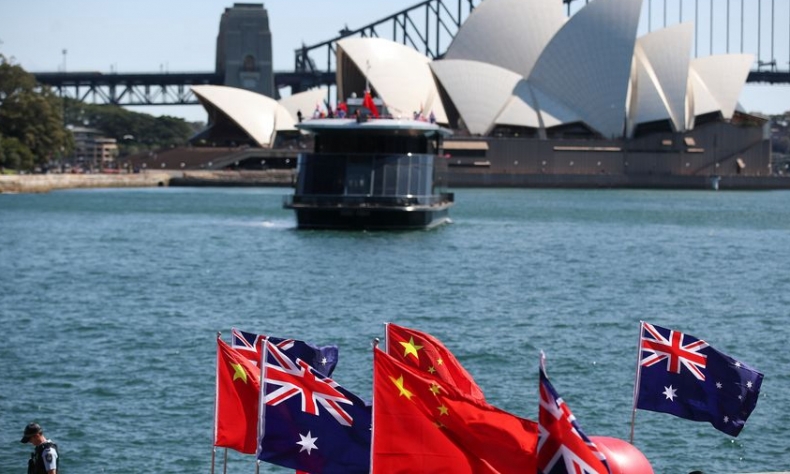What Makes Australia-Sino Relations Plummet?

The damage done to the Australia-China relationship may become a fine example of historical misjudgement.
Like many countries, Australia’s largest trading partner is China. Unlike many countries, Australia seems intent on aggravating China with a series of poorly implemented policy decisions. Bellicosity has replaced diplomacy, and this has seriously strained relations.
The situation has been inflamed by the rising level of unease and insecurity created by COVID-19 and associated lockdowns. It’s fertile ground for those who want to push policies based on fear and this has accelerated the tenor of policy statements, the most recent being the somewhat rushed upgrade and release of the Defence White Paper.
China’s reaction has included some statements of fact. Chinese tourists might decide to stop visiting countries perceived as unfriendly. That reaction, the conclusion of long-term trade disputes, allegations of dumping barley and the consistent mislabelling of export beef, have all been interpreted as examples of Chinese bullying or attempts to interfere with Australian domestic politics. Australia loudly rejects this ‘interference’ as an attack on Australian sovereignty but reserves the right to loudly comment on China’s domestic affairs in Hong Kong.
The deterioration in Australian-Sino relations can be traced back to Prime Minister Turnbull who initiated a more muscular approach, first by banning Huawei from Australian Government contracts and then later with some ill-considered comments. Former Prime Minster Rudd, himself no China supporter, derided these as “domestically and politically self-indulgent nuttiness.” The tenor and tone of this almost abrupt policy change reflected the developing position adopted by the United States.
The transition to adversary status was encouraged and hastened by a growing anti-China campaign supported by the Murdoch owned newspapers and TV media. The Australian Strategic Policy Institute became an influential player although it was required to register as an agency of foreign influence due to the funding it received from foreign Governments and foreign arms manufacturers. This febrile environment helped to increase the power and influence of the parliamentary security committee with its anti-China agenda.
These factors have all resulted in a successful push for an increasingly one-dimensional view of China, its activities and the perceived threats from China. The China relationship is viewed through a military, security and defence lens and like Lord Nelson, these groups turn a blind eye to the economic impacts of these policies. The resulting kangaroo diplomacy jumps from one policy issue to another without regard for a balanced strategy.
Australia has long had an uncomfortable relationship with Asia despite its claims to be in Asia, and more lately, an Indo-Pacific partner. For a brief period, Australia did play an influential independent foreign policy role in helping to establish APEC, but this turned out to be a fleeting moment of engagement led by internationalist Prime Minister Keating.
Australian foreign policy has always rested upon friendship with larger Anglo-Saxon ‘protectors.’ The 1942 fall of Singapore saw a quite rapid switch to the protective umbrella of the United States. Twenty first century foreign policy has included an embarrassing desire to out-friend others in the competition for American favours by unquestionably supporting American military engagements.
The reduction of US military commitments under President Trump and the rejection of long-time alliances with NATO and others has created deep concern amongst Australian defence policy makers. For a variety of reason, including support from an eager media, they have been able to dominate the public discussion which in turn makes some policy decisions an easier choice. The US policy companionship has continued under Prime Minister Morrison despite increasing unease from the business community. The stronger stance taken against China threats must be considered in this context.
Some policy and policy reactions appear to be an attempt to follow the Trump administration and so gain favourable treatment from this erratic President. These include, amongst others, the early banning of Huawei and the poorly implemented call for a routine WHO investigation into the origins of COVID-19. They also include the hastily convened inquiry into Diversifying Australia’s Trade and Investment Profile. This is clearly aimed at reducing or severing trade dependency on China. A range of anti-foreign interference measures have been adopted. These are desirable in their own right but were implemented with a clear aim at China and, ironically, strongly supported by some organisations who were later registered as agencies of foreign influence.
This is a hole largely of Australia’s own digging, although the popular narrative suggests it’s purely a response to “Chinese provocations” both in Australia and internationally.
It would be a mistake to accept that this public policy is an accurate reflection of the broader community. Business sectors underpinning Australia’s export earnings, and which make a massive contribution to Australia’s prosperity, are increasingly concerned at this rush away from diplomacy and balance. The one-sided nature of policy discussion and direction impacts adversely on every Australian whose job directly or indirectly relies on a smooth relationship with Australia’s largest trading partner. It’s estimated this is between 30 percent and 50 percent of the Australian workforce.
It will take time and considerable effort to restore balance to the Australia China relationship, but as former Prime Minister Keating observed ‘the dogs bark but the caravan moves on.” The damage done to the Australia-China relationship may become a fine example of historical misjudgement.
Daryl Guppy is an international financial technical analysis expert. He is a national board member of the Australia China Business Council.
The views expressed here are those of the authors and do not necessarily represent or reflect the views of China Focus.
 Facebook
Facebook
 Twitter
Twitter
 Linkedin
Linkedin
 Google +
Google +



